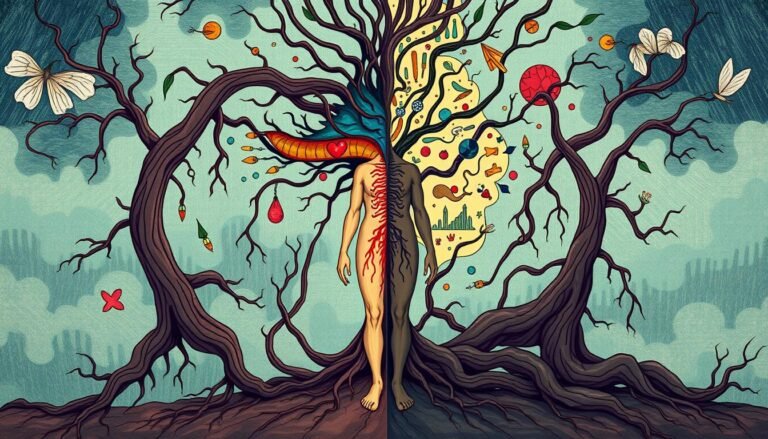Music Therapy: Healing Through the Power of Sound
Can sound waves really heal the body and mind? This is the core of music therapy, a healing method gaining attention in healthcare today. Sound healing and therapeutic music have ancient roots but are now leading in new treatments.
Music interventions are changing how we heal. They’re used in hospitals and psychiatric facilities, using music as medicine. People with pain, anxiety, or brain challenges find comfort in special sounds.
The science behind music as medicine is fascinating. Research shows music boosts our happy chemicals, endorphins and dopamine. This can lower pain, blood pressure, and improve mood. In hospitals, soothing music helps patients deal with tough feelings.
Music therapy is more than just listening. It often involves playing instruments like drums or guitars. This can improve memory, communication, and learning. For those with neurological or mental health issues, music is a special way to heal.
As we explore music therapy, we’ll look at its history, science, and uses. Get ready to see how sound is changing lives, one note at a time.
Understanding the Science of Sound and Music
Sound and music are now recognized for their healing powers. Melodic healing, vibrational therapy, and tonal treatments are gaining popularity. Studies show that music can deeply affect our brains and bodies.
How Music Affects the Brain
Music changes our brain chemistry in amazing ways. It releases dopamine and endorphins, which lower stress and pain. This makes music therapy a key tool in healthcare.
The Role of Frequencies and Rhythms
Specific sounds and rhythms are key in vibrational therapy. For instance, binaural beats and the 432 Hz frequency are thought to be therapeutic. They help us relax and focus better.
Neuroplasticity and Music
Music can change our brains. It creates new connections and strengthens old ones. This is great for people with Alzheimer’s, stroke, and Parkinson’s.
| Music Therapy Benefits | Percentage of Improvement |
|---|---|
| Reduced Anxiety | 65% |
| Improved Mood | 70% |
| Better Cognitive Function | 55% |
| Enhanced Motor Skills | 50% |
With over 5,000 music therapists in the US, melodic healing is getting easier to find. A study in the Journal of the American Medical Association found music’s benefits are as strong as exercise or meditation. This shows the power of tonal treatments in healthcare.
The History and Evolution of Music Therapy
Music therapy has its roots in ancient times. The first mention in the U.S. was in 1789. It has grown a lot since then, becoming a recognized medical treatment.
In the 1920s, music therapy started in hospitals. It was used in operating rooms and recovery areas. After World Wars I and II, musicians helped veterans with physical and emotional wounds.
The National Association for Music Therapy (NAMT) was founded in 1950. It set standards for music therapy education and training. In 1956, the Registered Music Therapist credential was created. A national Board Certification exam followed in 1985 to boost professional trust.
Now, music therapy is used in over 40 countries. The American Music Therapy Association (AMTA), started in 1998, represents music therapists in the U.S. and many other countries. The Certification Board for Music Therapists (CBMT) ensures music therapists are qualified, with over 8,000 certified.
| Year | Milestone |
|---|---|
| 1789 | Earliest reference to music therapy in the U.S. |
| 1920s | Music therapy expands into hospitals |
| 1950 | National Association for Music Therapy founded |
| 1956 | Registered Music Therapist credential established |
| 1985 | National Board Certification exam implemented |
| 1998 | American Music Therapy Association formed |
Music therapy is still growing, with more people needing its help. Music therapists are working hard to meet this need. The future of music therapy looks promising for healthcare and well-being.
Music Therapy: A Holistic Approach to Healing
Music therapy is a complete way to improve well-being. It helps with physical, emotional, and mental health. As more people look for natural treatments, music therapy is becoming more popular for its benefits.
Physical Benefits of Music Therapy
Music does more than just make us feel good. It can actually help our bodies. Research shows it can make us sleep better, lower blood pressure, and even prevent heart disease. It’s also a good way to manage chronic pain without drugs.
Emotional and Psychological Impacts
Music therapy is becoming a big deal in mental health care. It helps with depression, anxiety, and PTSD. Music therapists help patients express their feelings and find hidden emotions. This can really help improve mood and reduce stress.
Cognitive Improvements Through Music
Music therapy is amazing for the brain. It can help people with Alzheimer’s or Parkinson’s remember things and move better. It also helps stroke survivors talk and move better by using music’s rhythm.
| Condition | Music Therapy Benefit |
|---|---|
| Depression | Mood stabilization |
| Chronic Pain | Pain reduction |
| Dementia | Memory recall |
| Parkinson’s | Improved motor control |
Music therapy is a complete approach that uses different methods for the best results. Whether you’re playing music or just listening, it’s a powerful tool for health and happiness.
Applications of Music Therapy in Healthcare Settings
Music therapy is now a big part of healthcare. It helps patients in many places, like hospitals and mental health clinics. It’s making a big difference in how patients feel and recover.
Music Therapy in Hospitals and Hospices
In hospitals, music helps patients deal with sickness and treatments. A study at Beth Israel Medical Center showed this. It involved 272 premature babies.
Parents sang lullabies, and therapists used sounds like the womb. This helped the babies’ health and eating better.
Treatment for Neurological Disorders
Music therapy is also good for brain and nerve problems. A study found it helped Parkinson’s disease symptoms. The University of Toronto is studying this more.
Music Therapy for Mental Health
Music therapy is also great for mental health. A study at University Hospitals Connor Whole Health found it helped a lot. Patients felt better about themselves and their mental health.
“Music therapy is found in 42,000 healthcare facilities, covering hospitals, nursing homes, and schools.”
Music therapy is used a lot in healthcare. It helps with pain, brain problems, and mental health. It shows how music can be a powerful treatment in medicine today.
Innovative Techniques and Tools in Music Therapy
Music therapy is changing fast, using new techniques and tools. Digital apps are leading this change, making music therapy more personal and easy to get. MedRhythms is a startup that uses music to help people walk better after brain injuries. It shows how rhythm can help in healing.
Spiritune is another app that uses music to help people feel better. It uses science and music therapy to create programs that reduce stress. MindTravel offers silent piano sessions that mix music with meditation for a deep healing experience.
At UCLA Health, music therapists are doing amazing things. They give free music therapy to all patients. They make playlists, play live music, and even write songs with patients. Sessions can last up to 90 minutes, giving patients the care they need.
The future of music therapy is even more exciting with AI. AI can make music just for a patient, based on what they like and need. This makes music therapy even more precise. As we learn more, we’ll see even more ways music can help us heal.
Source Links
- How Music Helps People Heal | Harmony & Healing
- The Power of Music: To Feel, Heal, and Connect
- Understanding the Psychology and Benefits of Music Therapy – Save The Music Foundation
- The healing power of sound and music
- What Is Music Therapy, and How Can It Help Me?
- History Of Music In Healthcare – Harmony & Healing
- History of Music Therapy | American Music Therapy Association (AMTA)
- Then and now: the history of music therapy – Metro Music Makers
- How to Use Music as a Holistic Therapy Method
- Power of Music Therapy: A Holistic Approach to Mental and Neurological Health
- A Description of the Use of Music Therapy in Consultation-Liaison Psychiatry
- Music as medicine
- Benefits of Music Therapy in Medical Settings | Insights
- Music Therapy | UCLA Health
- The Intersection of Artificial Intelligence and Music Therapy » Flourish$Prosper Music Group








